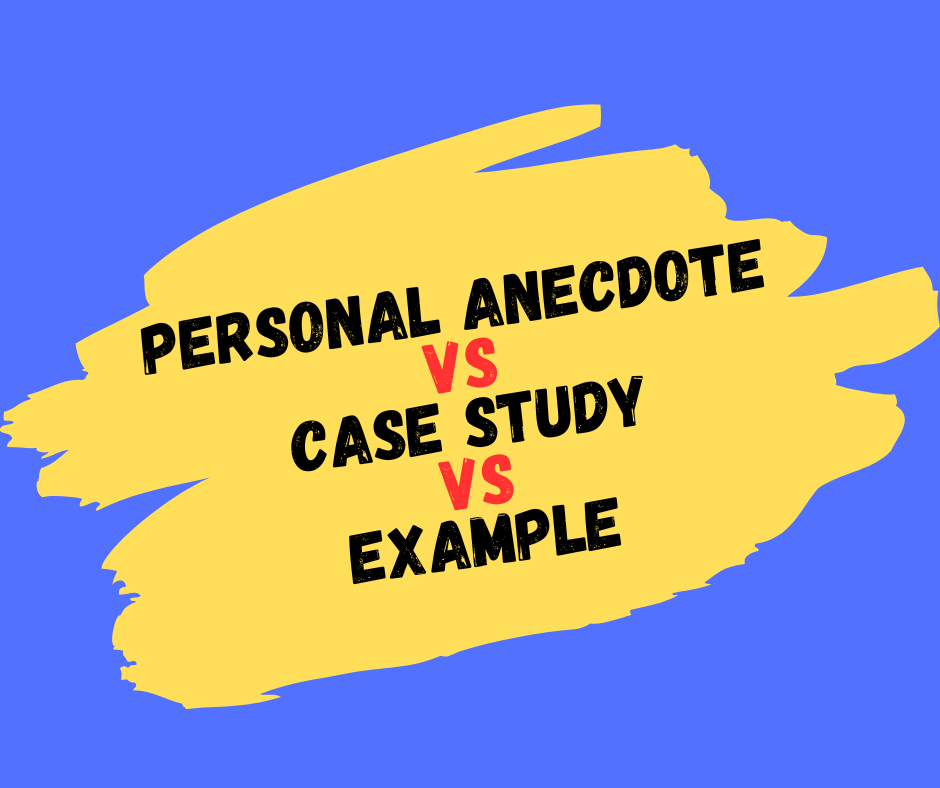Do you know these story definitions?
What's the difference between an anecdote, case study, and example?
TL;DR Version:
Some short definitions of different storytelling types
#1—Personal anecdote: a firsthand account that entertains, educates, or empathizes.
#2—Case study: an extended firsthand OR external account that proves a point.
#3—Example: a micro-case study to prove a point or connect ideas.
Regular Version: ⬇️
Last week, I shared a part of my upcoming book that talks about using personal anecdotes. And it reminded me of a LinkedIn comment I got months ago when I did a similar post:
“What’s the difference between an anecdote and an example?”
It’s a great question.
The answer … gets a little messy. Because in Storytelling, you can have many intersecting lines. But let’s give it a shot:
Personal Anecdote
The key word here is “personal.” What sets anecdotes apart is they are purely firsthand accounts. Another distinctive factor is they tend to be more informal in nature.
For instance, stories from parenting, marriage, childhood, or even a tense situation at work could all be anecdotes because they are events that happened directly to you. Regardless of the “packaging,” they are motivated by one of the three purposes of Story:
Entertain
Educate
Empathize
Great anecdotes can accomplish ALL of these. But how is that different from a Case Study?
Case Study
While a personal anecdote could also be a case study, the broader category of Case Studies leaves room for external accounts.
In Simon Sinek’s book The Infinite Game, he uses a host of case studies, including starting the book off using the case study of the Vietnam War. Sinek did not fight in nor have any say in how the Vietnam War turned out, but it makes a compelling non-firsthand account to make his point and engage the reader.
While case studies can also Entertain, Educate, or Empathize, they tend to lean towards the “Educate” side of storytelling. They also tend to be longer so that the author can pull out multiple lessons. Which brings us to…
Examples
The defining feature of examples are their brevity. A personal anecdote and case study are both technically examples. But in their purest form, examples are set apart by their shortness. (Also, the words “for example…” just in case you want to remove any guesswork.)
Examples are fairly pliable, though. They can be real-life instances or even made up scenarios. For example…
Real-life: “For example, when my dog farts, it’s a good reminder to get out of the office and get some fresh air.”
Made up: “For instance, painting my house lime green would definitely make it stand out, but it won’t increase the property value.”
Certainly, you can do a lot of mixing-and-matching with these three story types—and also some others, such as:
Problem-Solution stories
Mistake-Lesson stories
Imagination/Speculative stories
I’ll be getting into those three more in future posts, but if you’re a paid subscriber, you can go ahead and get a preview of Problem-Solution stories below.
And if you’re still struggling with what makes for a good personal anecdote story, consider booking a 60-minute coaching call with me and let’s figure it out.
Got a burning question about book writing? Then book a free 20-minute Q&A.
Did this help you? If so, share this with someone you know via the handy little button below.
And if you want even more content like this, you can subscribe and view the additional paid content below!
Automate your savings (and help support this newsletter) by signing up for the Acorns app. Oh yeah, and get a $5 thank you gift from them when you do.




